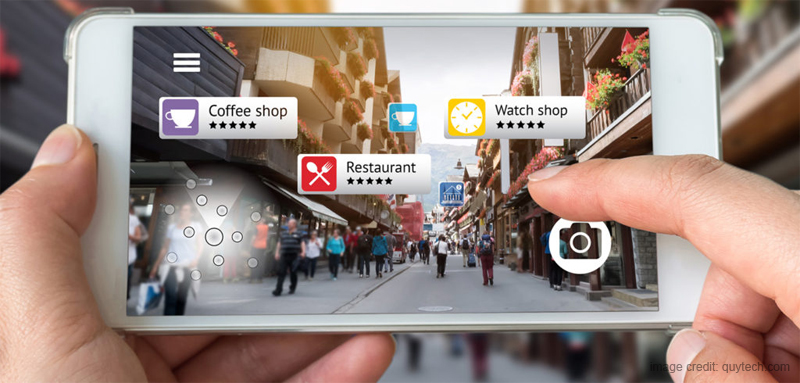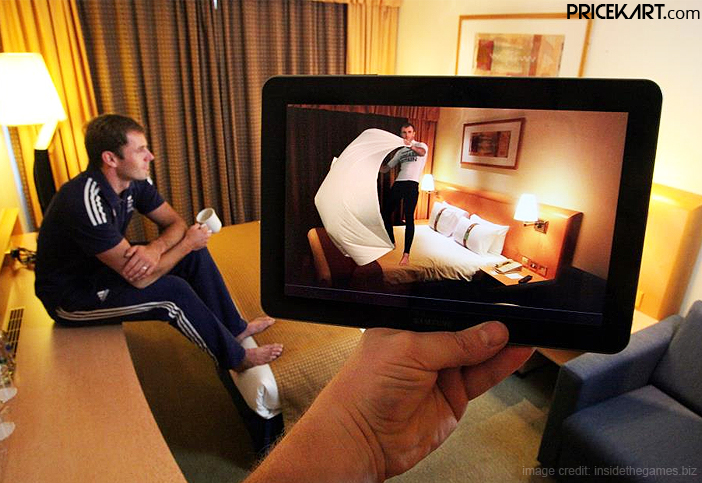Today, Augmented Reality is transforming customer experiences in a variety of landscapes. It is becoming an increasingly important tool in the crafting of marketing strategies for various applications, one such application being the hospitality industry.
Hotels, now more than ever are finding it more crucial to differentiate their brand experiences, especially if they seek to be on top of their competition, they must be ready to delight and introduce unique experiences. Behaviours such as; increase in adoption of mobile technologies and early adopters embracing new technologies are something Hotels must leverage upon. In recent times, consumers are becoming more mindful of the power of 3D technologies & AR, and the applications of it are already on its way to becoming a top trend among hotel technology. This recent popularity of AR has illustrated consumers’ willingness to embrace this new trend, as long as it delivers real value. We explore four ways in which augmented realities and 3D technologies are delivering value to the industry:
1. Making the room come to life
A picture might say a thousand words but Augmented or Virtual tours make the layouts feel so real, you can almost touch them! By leveraging 3D technologies and smartphones with depth sensors GeoCV is able to create interactive rooms within augmented environments that also feature highlighted pins to display more information about a specific point or product in the room/space. The most influential feature of a virtual tour is that the viewer feels completely in charge of controlling and navigating the environment.
This environment allows the viewer to scan through at their own pace, taking in every direction of the from various angles providing them with an unrivalled advantage of experiencing as well as having a high level of knowledge of the space they are paying for.
2. Expediting bookings
An article on The Verge recently suggested how travel is being disrupted by augmented technologies. Not only do they let your guests plan more efficiently with their peers but it also helps orient themselves before they reach the place, thus enabling interaction within the space in a more natural manner.
Statistics show us that hotels with a virtual tour included are clicked, on average, 10 times more than those without one. Moreover, a staggering 92% of internet users say the ability to view a 360-degree panorama is essential when they are browsing online.
As seen by these metrics, virtual tours create double the interest for your listings or spaces. Those who view with a virtual tour are twice as likely to make a reservation than viewing a traditional one.

3. Reimagining the guest experience
Airbnb has proposed that augmented reality helps open doors to make travel far more seamless by reducing otherwise hindrances to help provide a more transformative & unique experience. Moreover, the more immersed one is in a foreign place, the more they’ll learn about the people and culture. While this is traditionally delightful and transformative, it can also be frustrating when they’re utterly lost and everything is in a foreign language.
Augmented reality and similar technologies help with accurate contextual information that helps users recognize their surroundings a bit better and thus help traverse through these pain points. For example, using highlights and spatial tagging one can highlight specific furniture as well as guide points throughout the city. Highlights can also be used to help guests scan their room to find wall sockets, the room temperature and even information on art! Marriott has recently collaborated with Lifewtr to introduce this feature where guests are encouraged to browse virtual artwork and transform their rooms in seconds!
Thus integrating Augmented technologies within a hotel can not only help engage your guests as soon as they step foot but also help elevate their experience by infusing unique and delightful moments.
Starwood Hotels & Resorts have been further experimenting with AR by using beacon technology that helps guests receive a virtual key on their smartphone that enables them to unlock their room with a tap of a button. The main benefit here is expediting the check-in process for the guest. Hence as we see Augmented realities can be applied in a variety of applications within hospitality, it helps provide a touching point to improving the guest’s experience at every step.
4. Enhancing exposure
By adopting Augmented reality for guest experiences, hotels are able to appeal to a growing technology-embracing consumer population, as well as keep up with the trend of market-leading companies adopting AR solutions at exponential rates.
